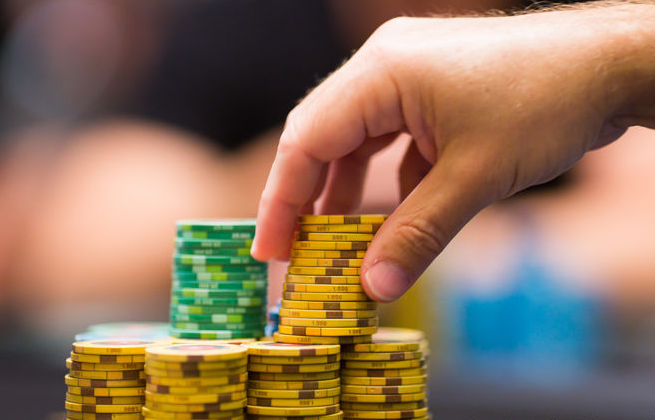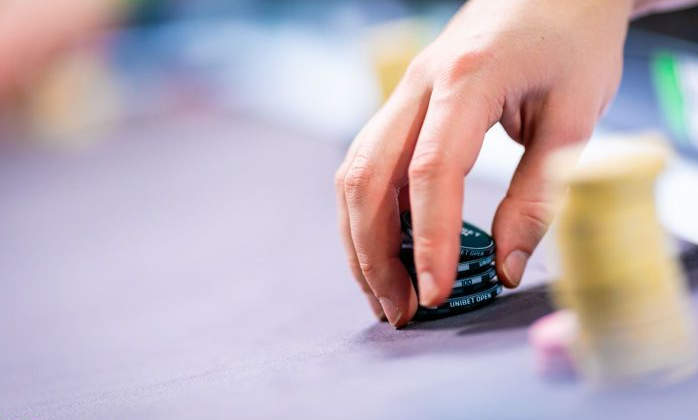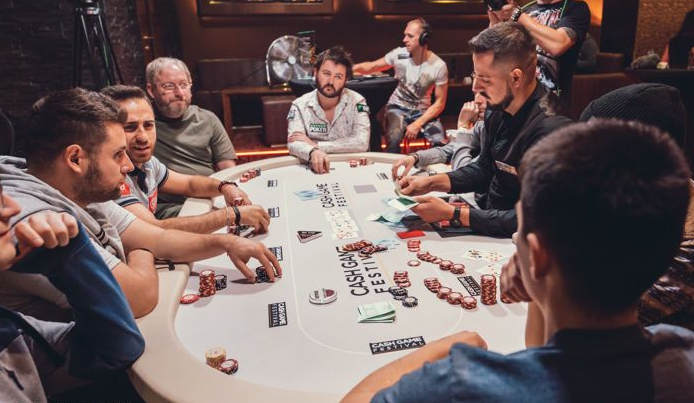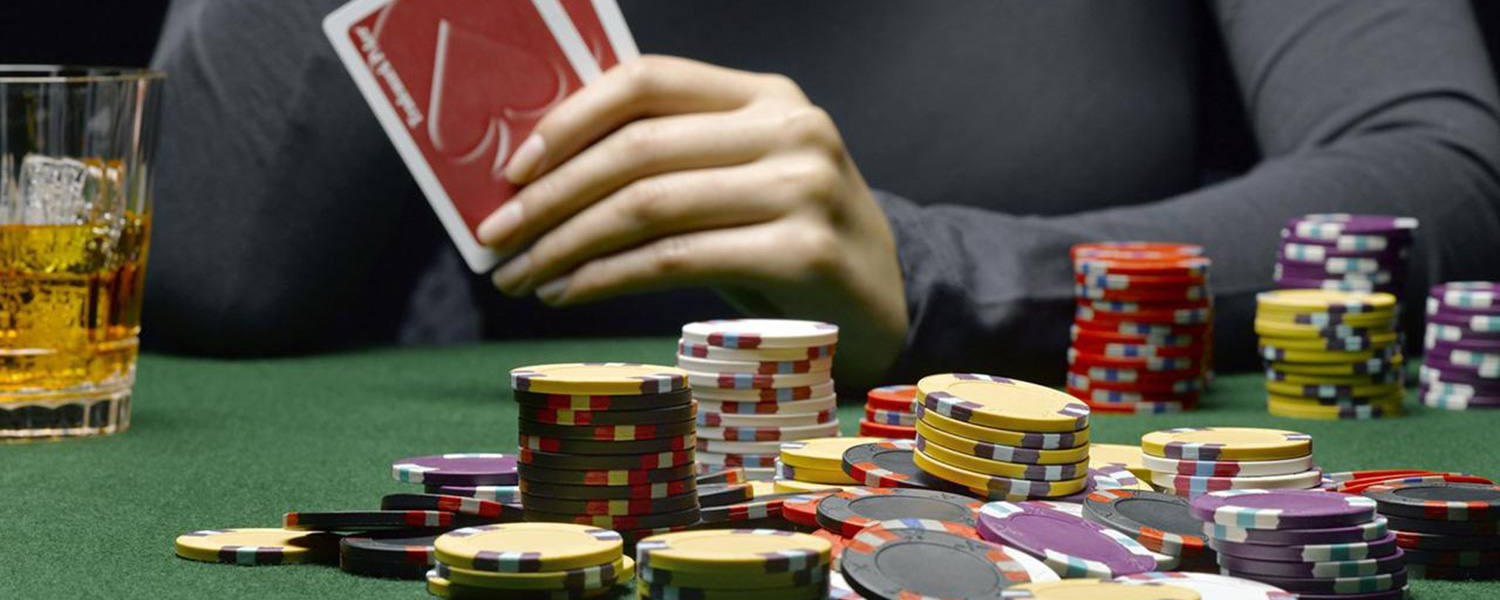In general, we improve our poker game by thinking more than the next player about what we are doing at the table.
Our mind is certainly our greatest weapon. Still, some thoughts tend to lead us in completely the wrong direction and should be avoided like rabid raccoons.
Here are five such thoughts depleting the bankroll. We will count them down from specific examples of self-sabotage to larger, broader mistakes caused by bad thinking.

5. “I really can’t fold right now”.
Imagine you’ve been playing $1/$2 no-limit Texas Hold’em for about 45 minutes.
During that time you’ve gotten few, if any, hands to play, folded almost all of your hands preflop, and have a few hundred dollars left in your stack when you get a {k-Spades}{10-Diamonds} hand in middle position.
Three or four players call a $2 blind before the action gets to you.
You think you need to do something to avoid further cementing your ossified image, which will kill any chance of action if you really hit a big hand in this rather loose and passive game.
Despite the fact that it’s not a hand on par with typical poker starting hands from this position, you make $12 to go.
Unsurprisingly, although you know your picture is very tight because of all the preflop folding you’ve been doing, the apparently non-tricky guy on the button raises to $30. He gets folded back to you.
Your immediate reflex is to fold, realizing that based on your image, the button is probably playing a range that could easily dominate your hand ({a-}{a-} through {10-}{10-}, {a-}{k-}, {a-}{q-}, {k-}{q-}).
He also has a position on you. But then you think that since you initiated the action and don’t want to look like a wimp by withdrawing from the fight, you really can’t fold now.
And that’s why you check.
The thought that you “can’t” fold is wrong – very wrong – because you’ve let your ego take precedence over your better judgment.
While it is true that your image at the table is a legitimate factor, “looking like a wimp” is not a legitimate reason to avoid folding.
While it’s easy to take a more attractive action than a logical one, you should dismiss the idea that you feel like checking.
Recognize that you can certainly fold, even if you initiated the action – and save your money for the next contest.
4. “He’s probably bluffing.”
Yes, of course there is bluffing in poker. You can win a lot of money by calling off a player when he doesn’t have what he represents.
But all too often, especially in home games in online poker and in the relatively low-stakes games in public poker rooms that most of us play, your opponent’s aggressive action indicates a really strong hand.
Still, many players cannot avoid believing that their opponent is bluffing, even if all rational considerations dictate folding.
In general, players want to play, so they look for excuses to do so, even if their better judgment tells them to fold.
It’s true that there are situations when your opponent is bluffing and checking makes sense. But guard against the tempting thought that your opponent may be bluffing, just to have an excuse to check someone when you really know you should fold.

3. “I have to bet here”.
In general, aggression at the table is a good thing. But players err when they give in to the idea that in some situations a bet is automatically required.
Here’s an example.
You are under the gun in a loose and passive house game ($1/$2 NL). You have {4-Spades}{4-Hearts} and you check, hoping no one raises too much so you can inexpensively “set mine.”
Fortunately, three players come in behind you, the small blind throws in an extra gold, and the big blind checks.
The flop completely misses your pair of fours, coming in with a score of {9-Clubs}{5-Spades}{2-Clubs}. The blind checks.
Although you have nothing, you have a reputation as an aggressive player and think you need to bet here to maintain that image.
So you bet $12. Everyone folds except the rather loose player on the button.
A {a-Spades} appears on the turn.
Now you think you need to bet again so your opponent doesn’t try to run you down if you check, so you bet $30. Your loose opponent checks you once again. Finally, when {9-Hearts} appears on the river, you think you have to show strength to win, so you make a shove – and lose to a smiling guy who checks you with a weak ace.
Realize what the problem really was.
It wasn’t necessarily that you shouldn’t have bet, although it’s hard to find a legitimate reason to do it as a bluff against a player you know is loose.
The problem was not what you did, but why you did it. You didn’t have to bet.
You probably should have checked and folded to the bet. But the thought that you had to bet to show strength sabotaged your better judgment, losing your stack in the process.

2. “I’m already stuck, what’s another few dollars?
Moving on to more general thoughts that can cause chip losses, this one can be truly devastating.
A $300 stack can be crippled just as effectively by 10 mindless calls costing $30 each as by one bad call worth the entire $300.
It doesn’t matter if you’re already down $200 or up $500 – a bad call is still a bad call, whether you’re up or down.
If you start to think that losing a little more doesn’t matter, it’s time to walk away from the table.
And this doesn’t just apply to poker. If you play other casino games, such as roulette or online blackjack, you need to apply the same logic and understand when it’s time to take a break or stop.
1. “I just need to get back to even before I leave.”
This thought is the worst of the bunch. Unlike the others, it has zero redeeming qualities and is always wrong-headed. Unfortunately, it is very common.
While being in the red may not be an indicator of how you’re playing – and while you may be able to “leave a winner” by staying longer – it’s much more likely that if you’re down, your game isn’t at its best and that you should pack up rather than hang on.
Think about it. If you’ve been at an online poker site or online casino long enough that you’re starting to think about “getting back to even playing,” chances are you’ve been playing there for a while.
You’re probably tired and your game has degraded, even if you don’t notice it yet.
Thinking that you just need to get back to even can herald a death spiral in poker. The longer you try to equalize, the more tired you become.
The more tired you are, the worse you play. The worse you play, the more you lose.
The more you lose, the bigger the hurdle to get back to even and the longer you have to stay to reach your dubious goal.
The only sure way to get out when you get so “stuck” is to lose your bankroll to play, or worse, to go completely broke, emptying your wallet, maxing out your credit cards and withdrawing funds from the ATM. A death spiral in poker, indeed!
Conclusion
The antidote to these crushing bankroll thoughts is, ironically, to think about them! That is, becoming aware that they have come to your mind, and thus being better prepared to combat their negative effects when they do.
Consider them carefully and remember them before your next game session.
By recognizing them in advance, you’ll be better able to avoid them and keep them at bay if they begin to infiltrate your poker game and sabotage your play.


